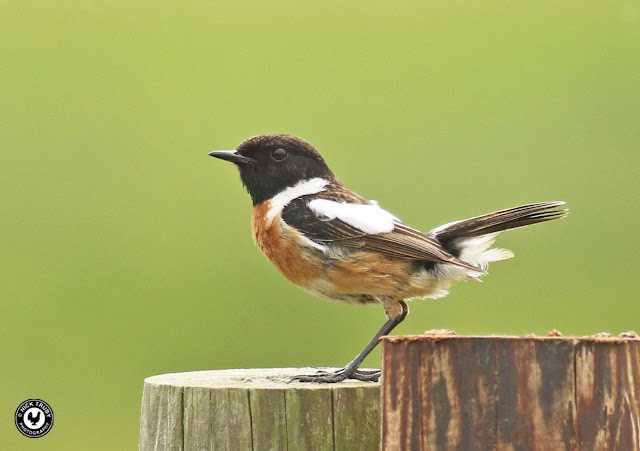The main object of this diversion was to see a special and scarce seabird that in the summer is generally found only in this part of the UK since it breeds on a small island just off the coast of Amble. I had booked Mrs Caley and myself on a boat trip that cruises out to the island and that was leaving at 14:30 so plenty of time to get to Amble beforehand since we'd left home at 08:00. It's a long old journey though, some 275 miles, but it went well with no hold ups and as we ate breakfast at a cafe somewhere near Scotch Corner I hatched an alternative plan. As I am prone to do! It would be a preamble to the preamble! (Sigh)
An hour later at 12:30 we pulled up alongside a shallow body of water very close to Hadrians Wall known as Grindon Lough. An American Wigeon had been present here for a few months and was pretty reliable so it was worth a look. I reckoned we had about 45 minutes to find the bird before leaving for the boat trip. I scanned the eastern end of the lake, the area where the duck was supposed to frequent, but could only find Eurasian Wigeon and a couple of Teal. We moved to the other end of the Lough and scanned again but once more it was just our common species that were seen. This wasn't going to plan at all and my hopes of a relaxing few days were dissipating rapidly and I was already getting stressed. At 13:00 I turned around and threatened to give it up and leave but thankfully stopped at the eastern end again and this time saw the American Wigeon close in to the near shore. Thank goodness! It must have been under the bank and hidden by overhanging grass when I first looked and hence I had missed it but now Mrs Caley and I enjoyed reasonable scope views albeit at some distance and distorted by a heat haze. After a few minutes the duck, accompanied by a female Eurasian Wigeon, hauled out onto the bank which was at least a bit closer and allowed me to take a few record shots. Not the first I've seen, in fact I think it's 6 now in the UK, but nice after dipping one in Inverness in February.
 |
| American Wigeon |
The boat was operated by "Puffin Cruises" lasted just an hour and carried just 12 passengers so would be a pleasant little trip. It was now a blazing hot day and as we waited for the boat to be readied we watched some beautiful Eider ducks (and drakes) swim and feed amongst the slime and weed in the rather filthy inner harbour. As we looked towards a young herring gull it viewed us just as intently (probably hoping we had chips).
 |
| Eider |
 |
| Juvenile Herring Gull |
 |
| Coquet Island |
 |
| Sandwich Tern |
 |
| Arctic Tern |
 |
| Puffin |
 |
| Guillemot's |
 |
| Razorbill |
 |
| Kittiwake |
 |
| Roseate Tern's |
 |
| Puffin |
 |
| Juvenile Gannet (with trailing fishing line) |
 |
| Adult Gannet |
 |
| Ringed Plover |
 |
| Skylark (pre Merlin attack) |
At breakfast we watched the only Nuthatch that we'd see on this trip (they are extremely rare in the Highlands) before leaving for another crack at the Glossy Ibis. Again there was no sign on the floods but this time we got chatting to a couple of locals and they advised us to try an area known as the Budge Fields which are located further down the reserve. Almost as soon as we'd looked out of the rudimentary viewing screen Mrs Caley exclaimed "there it is!" and sure enough it was. Not close but a nice bird nonetheless and the day was off to a good start.
 |
| Glossy Ibis |
 |
| Black-tailed Godwits |
 |
| Barn Owl |
 |
| Avocet |
 |
| Reed Bunting |
 |
| Yellow Wagtail |
 |
| Sedge Warbler |
 |
| Goldfinch |
 |
| female House Sparrow |
 |
| male Stonechat |
 |
| Swallow |
 |
| female Goosander |
 |
| Oystercatcher |
Midway through the night we were serenaded by two Tawny Owls having a sing song ding dong at each other but it was too dark to make them out in the trees. I looked in likely spots before breakfast but couldn't find them.
so it was on to the remaining 170 miles drive north and to our cottage for the next fortnight where we can settle in and get into some serious birding and hopefully find the special birds that make the area so appealing.









